Both BIOS and Bermuda College are known for providing outstanding educational opportunities in science, technology, engineering and mathematics (STEM) subjects for the island’s young people. While the Bermuda College is a degree-granting institution and BIOS is a not-for-profit research and education facility that focuses on training local students in primary, middle, and high school, both organizations have a similar goal: to provide the island’s children and young adults with the knowledge, skills, and experiences required for future success in academics and the workforce.
A Joint Effort on the High Seas
June 28, 2019
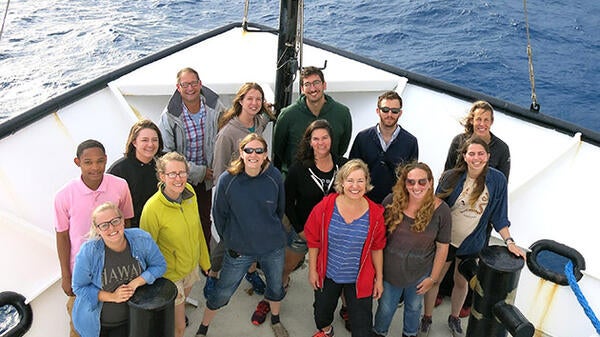
Late last month, a four-day research cruise on the Sargasso Sea gave two local educators and a senior school student the opportunity to gain unique insight into what it means to live and breathe science aboard a working research vessel. The cruise was part of a project funded by the National Science Foundation (NSF) investigating the daily migrations of small marine zooplankton called copepods.
How Do We Understand the Ocean?
July 25, 2019
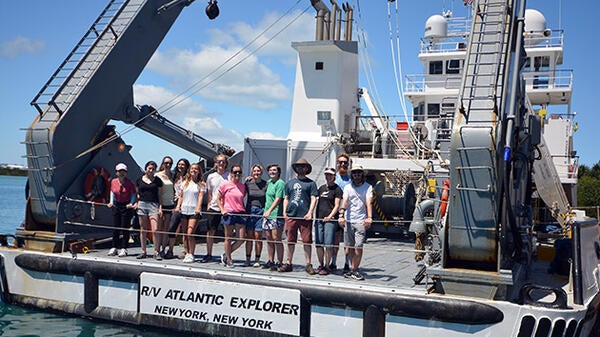
This summer marks the third year that BIOS has offered its Modern Observational Oceanography (MOO) course to undergraduate and postgraduate students enrolled in oceanography programs. The course aims to provide students with a broad introduction to, and practical experience in, the field of observational oceanography—a rapidly developing area of study that focuses on using a variety of technologies and methods to further our understanding of how the physical state of the ocean is changing.
Educating the Educators
July 25, 2019
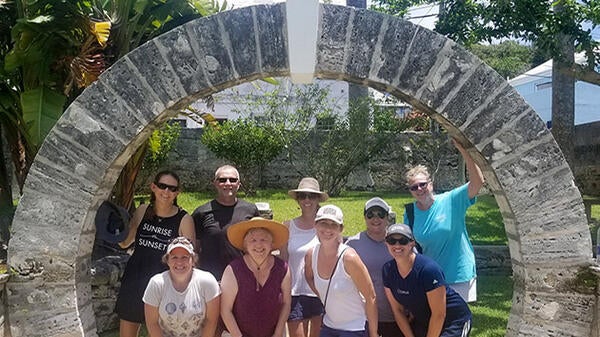
Having brought students to BIOS for more than 40 years, Ed Argenta—a teacher consultant with the Connecticut Geographic Alliance—was already familiar with what the Institute had to offer in terms of hands-on learning experiences. However, in 2012, a conversation with BIOS education staff, including Kaitlin Noyes, director of BIOS’s Ocean Academy, led to the idea of developing a summer course for educators.
This Job is for the Birds
March 29, 2019

One of the most rewarding aspects of running a decades-long education program is following up with former students to learn where their experiences have taken them, both personally and professionally.
Dalhousie and BIOS Announce New Collaborative Program
May 20, 2014
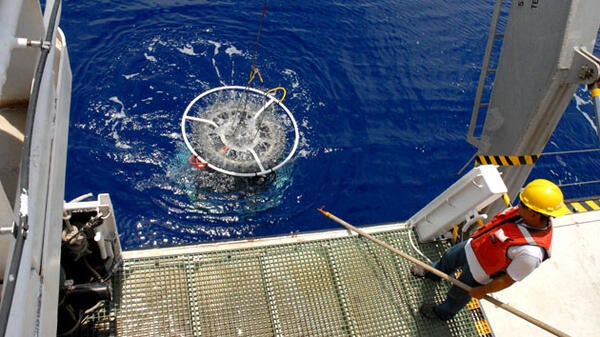
After years of collaborating on a variety of education programs, Dalhousie University and BIOS have taken a significant step in formalizing and expanding their partnership: the launch of new opportunities through the Dalhousie-BIOS Experiential Learning Fund. This fund, established in 2011, was designed to strengthen ties between these two leading ocean research institutions and create a continual flow of students from Dalhousie to BIOS. While many Dalhousie students have taken classes or conducted internships at BIOS over the years, there was no formal program supported by the Dalhousie-BIOS Experiential Learning Fund…until now.
BIOS and Bermuda Sloop Foundation Form New Collaboration
May 29, 2014
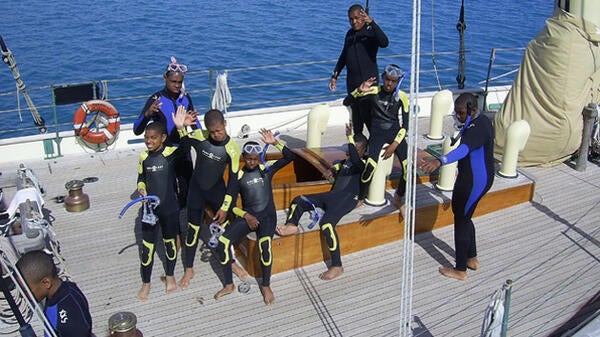
Since 2006 Bermuda Sloop Foundation has been providing Bermuda’s youth with experiential learning and character development aboard their unique floating classroom: Sail Training Vessel (STV) Spirit of Bermuda. In that time, more than 3,000 students have stood upon the vessel’s deck, learning critical life skills including communication, teamwork, nutrition, and respect.
Princeton Students Learn Marine Biology at BIOS
June 25, 2014
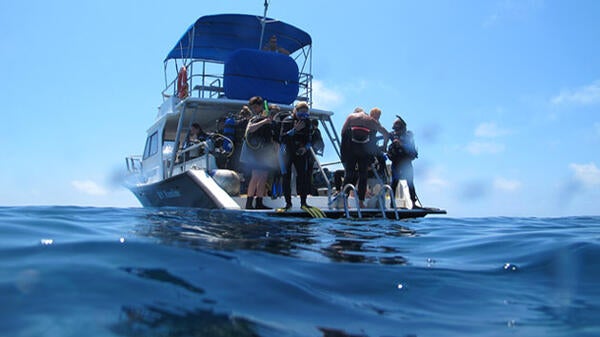
For the past nine years, a group of students from Princeton University has traveled to Bermuda each June to participate in a four-week marine biology course offered through a unique partnership between BIOS and the university. Co-taught by Dr. Samantha de Putron (Associate Scientist at BIOS and Visiting Lecturer at Princeton) and Dr. James Gould (Professor of Ecology and Evolutionary Biology, Princeton), the course is an intensive field program that covers all aspects of marine biology. Dr. Carol Gould (science writer) adds a unique perspective as a guest lecturer and—this year—Dr. Penelope Barnes (BIOS Education Director for University Programs) and Kaitlin Baird (BIOS Science Education Officer) also contributed as guest lecturers.
2014 Chief Scientist Training Cruise – The Story Behind the Science
June 30, 2014
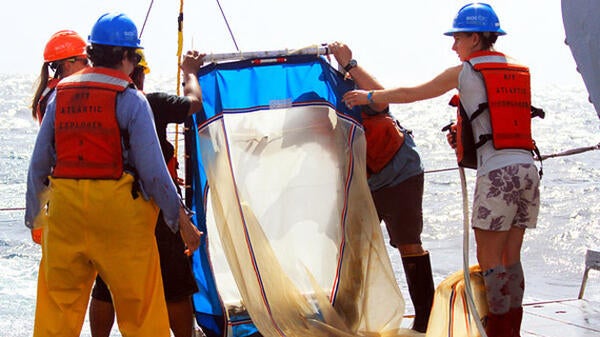
Earlier this month, the 2014 University-National Oceanographic Laboratory System (UNOLS) Chief Scientist Training Cruise wrapped up, with the R/V Atlantic Explorer returning to her berth at BIOS after a nine day cruise between Barbados and Bermuda. The purpose of these cruises is to give early-career marine scientists, including PhD students, insight into what it takes to successfully plan and execute a research cruise—everything from acquiring funded ship time to mobilizing laboratory equipment and supplies, from reporting at sea to living aboard a working research vessel.
Teachers On Board with MARINE: Mid Atlantic Robotics IN Education
December 17, 2014
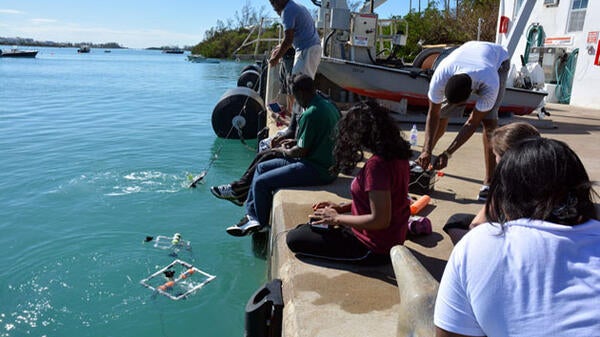
This past month, sixty primary and middle school educators from the Bermuda Union of Teachers came to BIOS to participate in a professional development workshop focused on marine robotics. The workshop involved PVC pipes, car batteries, foam noodles, propellers, and a race against time as participants were challenged to build their own Remotely Operated Vehicles (ROVs) for launch into the Sargasso Sea. Successful ROVs are neutrally buoyant and can be maneuvered through the water to complete tasks, mimicking the professional classes of underwater robotics used around the world to collect data for science and industry.
